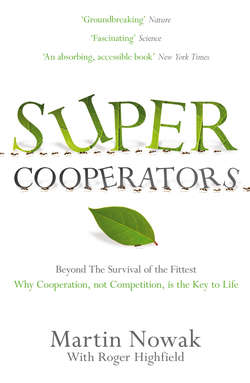Читать книгу SuperCooperators - Roger Highfield - Страница 30
На сайте Литреса книга снята с продажи.
THE EVIDENCE
ОглавлениеThere’s a telling joke among scientists that every new theory has to pass through three phases of “acceptance”: first, it is completely ignored; second, it is obviously wrong; and third, it is obviously right, but everyone knew that anyway. Karl and I were fortunate. We did not become the punch line of this old joke—at least not this time.
A couple of years after our walk, we found ourselves writing a comment for the journal Science on a clever piece of experimental research that had provided backing for our Nature paper on indirect reciprocity. Working at the University of Bern in Switzerland, Claus Wedekind and Manfred Milinski had started out with seventy-nine first-year students who were blissfully unaware of concepts such as reciprocal altruism and invited them to take part in a game in which they had the option to donate money to other individuals in the group.
The game consisted of encounters between pairs of students who were connected by a computer network. One student was the “donor,” the other the “recipient.” If the donor paid one Swiss franc out of his account, the recipient would receive four. Thus the cost for the donor was 1 SFr and the benefit for the recipient was 4 SFr. As ever, for productive cooperation the benefit must exceed the cost. Alternatively the donor could decide to pay nothing and, of course, the recipient would not receive a bean. When making his decision about whether to give or to hang on to his money, the donor was informed about what the recipient donated in previous rounds. For example, a donor could learn that her recipient was stingy and never gave a thing, or was relatively generous and gave two out of three times. In order to exclude the effects of direct reciprocity, the experiment was arranged in such a way that the same two students did not meet again.
The outcome of the experiment was convincing. Wedekind and Milinski found that even when there is no chance of direct reciprocity players are generous to each other provided that they have an opportunity to keep tally of the actions of their fellow player. We cooperate more with those who have a good reputation. As a result, people who started off by being generous ended up with a high payoff. We like to give to those who have given to others. Give and you shall receive!
